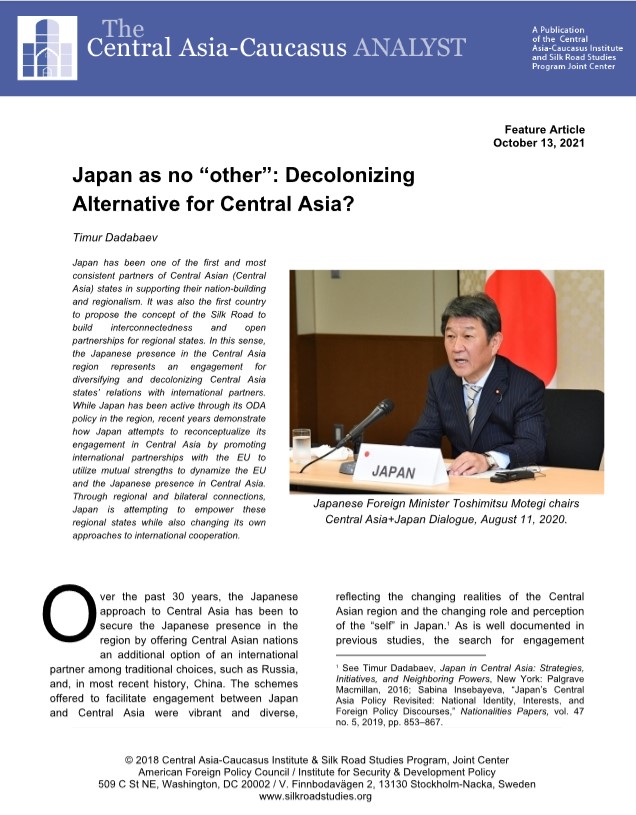Japan as no “other”: Decolonizing Alternative for Central Asia?
Japan as no “other”: Decolonizing Alternative for Central Asia?
By: Timur Dadabaev
 Japan has been one of the first and most consistent partners of Central Asian (Central Asia) states in supporting their nation-building and regionalism. It was also the first country to propose the concept of the Silk Road to build interconnectedness and open partnerships for regional states. In this sense, the Japanese presence in the Central Asia region represents an engagement for diversifying and decolonizing Central Asia states’ relations with international partners. While Japan has been active through its ODA policy in the region, recent years demonstrate how Japan attempts to reconceptualize its engagement in Central Asia by promoting international partnerships with the EU to utilize mutual strengths to dynamize the EU and the Japanese presence in Central Asia. Through regional and bilateral connections, Japan is attempting to empower these regional states while also changing its own approaches to international cooperation.
Japan has been one of the first and most consistent partners of Central Asian (Central Asia) states in supporting their nation-building and regionalism. It was also the first country to propose the concept of the Silk Road to build interconnectedness and open partnerships for regional states. In this sense, the Japanese presence in the Central Asia region represents an engagement for diversifying and decolonizing Central Asia states’ relations with international partners. While Japan has been active through its ODA policy in the region, recent years demonstrate how Japan attempts to reconceptualize its engagement in Central Asia by promoting international partnerships with the EU to utilize mutual strengths to dynamize the EU and the Japanese presence in Central Asia. Through regional and bilateral connections, Japan is attempting to empower these regional states while also changing its own approaches to international cooperation.
The Pap-Angren Railway and Its Geoeconomic Implications for Central Asia
By Mirzohid Rahimov
April 19th, 2016, The CACI Analyst
Central Asian nations consider the development of alternative regional transport communications important aspects of their national economic and political strategy, and the republics have become active participants in various international projects to promote economic cooperation with different countries and regions of the world. The development of internal Central Asian communication networks in general, and Uzbekistan in particular, gives the possibility of extending not only national communications, but also broaden networks in Central Asia. The Angren-Pap rail project is very important for national connectivity and for increased international communication. Different international experiences in economic transformation are relevant for Central Asia’s regional connectivity.
Central Asia, the AIIB and the advent of 5G communication
By Kairat Bekov and Gregory Gleason
April 1st, 2016, The CACI Analyst
Competition over technological advantage has replaced rivalry over territorial advantage in the great games of contemporary Central Asia. One of the main thoroughfares of the modern “Silk Road” is the telecommunications highway. The impending advent of fifth generation telephone technology is opening yet a new sphere of interaction among the countries of Central Asia offering as many opportunities for regional cooperation as it creates for competition.
TAPI and India's energy diplomacy
By Sreemati Ganguli
February 5th, 2016, The CACI Analyst
The recent ground-breaking ceremony of the Turkmenistan-Afghanistan-Pakistan-India (TAPI) pipeline, was followed by several Indo-Russian Memoranda of Understanding (MoUs) on energy during the 16th annual Indo-Russian Summit in Moscow in December 2015. These events add to Rosneft’s decisions in 2014 to buy a 49 percent share in Essar Oil in mid-2015 and to cooperate with OVL, both Indians companies, on exploration and hydrocarbon production in Russia’s offshore Arctic. Also, Prime Minister Narendra Modi visited Central Asia in July 2015, particularly Kazakhstan and Turkmenistan, to declare India’s growing importance as an alternative energy market in Eurasia, aside from the EU, China and Japan, and as a potential power in the energy-rich Eurasian space.
Japan's and China's different functions in Asia
By Najia Badykova
January 15th, 2016, The CACI Analyst
On November 24, a Japanese delegation met in Ashgabat with the deputy foreign ministers of five Central Asian states in a “Central Asia plus Japan” format to discuss regional security, sustainable development, trade and investment, as well as regional cooperation and disaster prevention. In October, Japanese Prime Minister Shinzo Abe visited all of the Central Asian states as a part of Tokyo’s efforts to strengthen economic relations with the resource-rich region, holding talks with Central Asian leaders mainly devoted to the energy issue. This is an important shift in Japanese foreign policy. Its long-time competitor China is already established in Central Asia and Tokyo’s recent initiatives have been described as part of the growing competition between China and Japan.







